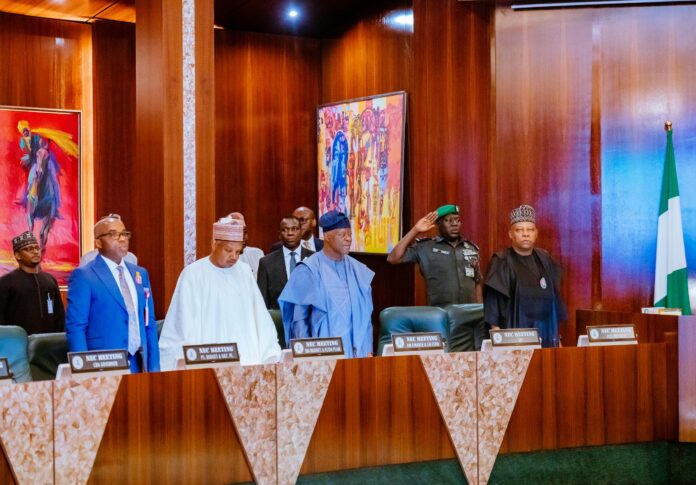Presidency engages National Assembly on tax reform Bills
The Presidency has stepped up its efforts to persuade the National Assembly to pass the tax reform bills.
Sources revealed that the leadership of the House of Representatives has called a crucial meeting with caucus leaders to rally support for the bills among lawmakers.
The meeting is set for today.
Sources further revealed that the Presidency is eager for the tax reform bills to be passed before the year ends so they can take effect by January 1, 2025, in tandem with the 2025 Budget.
This renewed push follows mounting pressure from northern governors, who are urging lawmakers from the region to resist the reforms.
The Northern States Governors’ Forum and traditional rulers from the region have rejected the proposed amendments, particularly the plan to shift the distribution of value-added tax (VAT) to a derivation-based model. They argue that this would disproportionately harm the northern region and other subnational entities.
Following this opposition, the National Economic Council (NEC), led by Vice President Kashim Shettima, recommended that the tax reform bills undergo further scrutiny. However, President Bola Tinubu insisted that the bills should proceed through the legislative process.
A lawmaker who spoke to newsmen confirmed that the Presidency is intensifying its lobbying efforts.
“They are reaching out to lawmakers to secure their support for the bills,” the lawmaker, who preferred to remain anonymous, said.
He acknowledged that while lobbying is a common practice in democracies like the United States, it is equally valid for lawmakers to push back if they believe the reforms will not benefit their constituents.
READ ALSO: Tinubu’s tax reform bills, the rich and State Governors by Kazeem Akintunde
Journalists report that northern stakeholders’ opposition to the bills intensified after President Tinubu transmitted the four tax reform bills to the National Assembly for consideration on October 3.
The bills include the Nigeria Tax Bill 2024, which aims to establish a comprehensive fiscal framework for taxation; the Tax Administration Bill, which seeks to provide a clear legal structure for taxes and reduce disputes; the Nigeria Revenue Service Establishment Bill, which would replace the Federal Inland Revenue Service (FIRS) with the Nigeria Revenue Service; and the Joint Revenue Board Establishment Bill, which proposes the creation of a tax tribunal and tax ombudsman.
The push from northern governors to persuade their lawmakers to oppose the bills was confirmed last week by the deputy spokesperson of the House of Representatives, Philip Agbese (APC, Benue). He disclosed that some governors had threatened lawmakers with the potential loss of re-election tickets in 2027 if they supported the bills.
Amid this growing pressure, several lawmakers have emphasized their commitment to prioritizing their constituents’ interests, rejecting external pressure in favor of local concerns.
Senator Abdulrahman Kawu Sumaila (Kano South), speaking with newsmen, stated that while he had not been directly lobbied, his loyalty lies with his constituents. “We are studying the bill and consulting with our constituents and relevant stakeholders to understand their views,” he said. “It is the people’s will that will prevail.”
In a separate interview, former Deputy Senate Leader Senator Abdul Ningi (PDP, Bauchi Central) strongly criticized the tax reform bills, calling them discriminatory and favoring specific states, particularly Lagos. He accused the President of exploiting people’s fears to push the bills through despite their exclusionary nature.
“The crux of the bill lies in its discriminatory nature,” Ningi said, comparing it to past controversial policies that were rejected by lawmakers despite containing some positive clauses.
Ningi also pointed to the inequitable VAT distribution as an example of the reforms’ flaws, citing the case of maize processing. “You buy maize in Kaduna without VAT, but when it’s processed into Semovita in Lagos, VAT is collected and returned to Lagos. Where’s the fairness in that?” he asked.
Rep. Kwamoti Bitrus Laori (Demsa/Lamurde/Numan Federal Constituency, Adamawa) echoed similar concerns, stating that his priority is the welfare of his constituents. “I was elected to represent my constituency, and we must understand what’s best for our people before deciding on the bill,” he said.
Rep. Bappah Aliyu Misau (Misau/Dambam Federal Constituency, Bauchi) also expressed strong opposition to the reforms, stating that no lawmaker from Bauchi will support the bills due to their lack of benefit for the region. “The presidency cannot pressure us. This is about protecting the average person in Bauchi,” he said.
Another unnamed lawmaker suggested that for the Presidency to gain the support of northern leaders, it needs to clarify how the new VAT distribution model would work and provide a detailed template of the sharing formula.
The Northern Elders’ Forum (NEF) has also strongly opposed the tax reform bills, calling them divisive and poorly conceived. The forum criticized the lack of adequate consultation with key stakeholders, especially the NEC, which was excluded from the deliberations.
Professor Ango Abdullahi, the convener of NEF, warned that the bill, in its current form, could threaten the unity and cohesion of the country, urging northern lawmakers to stand firm in defending the region’s interests.
The NEF also expressed support for the stance of northern governors and traditional rulers, calling it “patriotic.” The forum cautioned lawmakers against compromising their position and warned of the potential electoral consequences.
When contacted for comment, the Special Adviser to the President on Senate Matters, Senator Basheer Lado Mohammed, promised to respond but had not done so by press time. The Special Adviser on Media, Bayo Onanuga, was unavailable for comment.
On Trust TV’s Sunday Politics, the Special Adviser to the President on Policy Communication, Daniel Bwala, defended the lobbying efforts, stating that the President was merely fulfilling promises made during his campaign. He emphasized that the lobbying was in line with the President’s commitment to good governance.
A source close to the Presidency also defended lobbying as a legitimate part of democratic governance, noting that it is a standard practice in presidential systems like the United States. “That’s why the President has special advisers on National Assembly matters, who serve as the chief lobbyists,” the source said.
Proofreading by Uchechi Ojo, Sub-editor at NeptunePrime.
Follow the Neptune Prime channel on WhatsApp:
Do you have breaking news, interview request, opinion, suggestion, or want your event covered? Email us at neptuneprime2233@gmail.com





